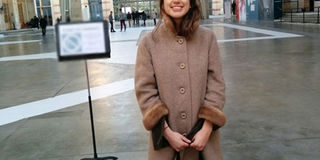Breaking News: At least 10 feared to have drowned in Makueni river
BY THE BOOK: Stephanie Papa

Stephanie Papa.
What you need to know:
- Poetry—though not a genre of writing but another craft altogether—takes up 88% of her bookshelf, and the rest is mostly non-fiction.
- She is about appallingly fussy about fiction and doesn't often find novels that grip her.
- Her least favourites would be horror and chic lit. Even worse, a combination of the two.
Stephanie Papa is a poet and translator living in Paris, France.
She has a Master of Fine Arts degree in poetry from the Pan European program and is co-editor of Paris Lit Up magazine.
Her work has been published in The Stinging Fly, World Literature Today, Niche, Yasakmeyve, NOON, great weather for MEDIA, Four Chambers Press, Paris/Atlantic. Literary Bohemian, 5×5, Rumpus, Cleaver Magazine, The Prose Poetry Project and One More Glass.
Stephanie also runs anglophone writing workshops and readings in Paris. She spoke to Nation.co.ke about her all-time literary favourites:
What books are on your reading list for the next couple of months?
I really loved hearing Sinead Morissey read from her Forward-prize winning collection, On Balance, so I’m excited to explore more of her work. I’m going to tuck into Only the Road, an anthology of Cuban poetry, and Storms Under the Skin the selected poems by Henri Michaux translated by the talented British poet, Jane Draycott.
A mix of Blue Planet 2 and the brilliant podcast BBC “The Life Scientific” led me to Jonathan Balcombe’s book, What a Fish Knows. So far, it’s not so much a plea against fishing, but a reality check about how evolved these animals are. I’ve also just started The Bloodless Revolution, about the history of vegetarianism— holiday reading at its best.
What were your three most enjoyable reads for this year?
Nick Makokha’s fantastic debut collection, Kingdom of Gravity, from Peepal Tree Press is a really staggering; a dark confrontation of post-colonial Uganda and Kenya. In a similar vein, David Anderson’s History of the Hanged, a haunting and essential account of the Mau Mau rebellion, which I read after travelling to Kenya in February.
I couldn’t help but love The Zoo of the New, a hefty but homey anthology of poetry edited by Nick Laird and Don Paterson. James Thomas’ English translation of Manciet’s The November Boy from the original Occitan is magnificent. It’s a striking story set in 1920s region of Les Landes, and a rare taste Occitan.
Which two books do you hold so dear that they can’t possibly be lent out?
I don’t think there are any books you’d have to pry out of my fingers to get a hold of. But a close contender is The Hoffnung Music Festival, illustrations by Gerard Hoffnung.
Your childhood favourite books? Why?
All of Roald Dahl’s stories played a magical role in my childhood, and even adulthood, in his more vulgar books like My Uncle Oswald. I was loyal to anything by Maurice Sendak, for the simplicity and brilliant illustrations. Beatrix Potter was on the top of the pile as well, and later, The Chronicles of Narnia by C.S. Lewis. I was very lucky to be exposed to lots of stories as a child.
If you were to dine with three writers dead or alive, who would they be and why?
This answer changes every day. Today, it would be P.G. Wodehouse, Frank O’Hara and Vladimir Nabokov for wit, pizazz and intellectual astonishment.
Most unforgettable character from a book? Satan in Mikhail Bulgakov’s The Master and Margarita.
Which book do you wish you had written and why?
J.D. Salinger’s Raise High the Roof Beam, Carpenters or his entire Nine Stories collection. They’re so earnestly alive, and he was a master of dialogue. As for poems, I wish I’d written James Wright’s poem, A Blessing.
If you were sent off to Robben Island for a year, which books would you take with you?
I’d say the Collected Poems of Dylan Thomas. I always come back to him. He’s soothing and familiar, and yet complex enough that I could spend a stranded lifetime reading him.
Then there is Love is the Heart of Everything; love letters and small sketches between Vladimir Mayakovsky’s and his publisher’s wife, Lili Brik. Open it to any page and you won’t be disappointed.
Lastly, I would take The Anchor Book of Chinese Poetry, edited by Tony Barnstone and Chou Ping. The most satisfying anthology of poetry I’ve ever read, with immaculate footnotes.
What are your favourite genres to read and which is your least favourite?
Poetry—though not a genre of writing but another craft altogether—takes up 88% of my bookshelf, and the rest is mostly non-fiction. I’m about appallingly fussy about fiction; I don’t often find novels that grip me. I suppose my least favourites would be horror and chic lit. Even worse, a combination of the two.
What’s the most interesting lesson you have learnt as editor of the journal Paris Lit Up?
Content. Choosing poetry for the craft and impact, regardless of the poet’s status, previous publications, or personal relationship to you. It’s really an honour to publish voices from different corners of the world, and discover new writing that moves me. Collaboration is also essential; adapting to other editors and collaborators, giving everyone a fair space, being open to everyone’s opinion.





